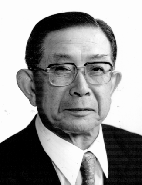
SAITO Hiroshi
Chairman of the Board of Councillors
Keidanren
This is going to be a formidable work for Keidanren, but fifty years after the war, and standing at a major turning point of our economic society, we are confronted with the pressing need for making a basic overhaul of our vision of the 21st century. In looking back, it seems that we have come a long way with a single-minded pursuit of economic growth as our sole target in trying to catch up with and overtake the economic standards of the victor nations--the process that began when we at long last regained a decent standard of human living after literally crawling out of the ruins brought by our defeat in war fifty years ago. In the interim, it was extremely fortunate that we were able to live in peace to the fullest with all other nations for the past fifty years, with only a very light burdensharing of defense expenditures thanks to the protection of the United States nuclear umbrella and by eschewing rearmament under our new war-renouncing constitution. Not only that, our country was spared of involvement in the Korean War and the Vietnam War that occurred so close to our shores in Asia. It was all in consequence of this blessed era that Japan could attain a feat of such remarkable growth as is often called a miracle in the world economy and capture the status of the world's second largest economic superpower.
It must be recognized, however, that one upshot of this catching up and overtaking process was the discord our country has brought into the international economic community. Faced with the need to address the problem of the surging yen stemming from the vast surplus in our current account as a root cause, we remain helpless still to this day in our effort to persuade the United States and other countries with any of the prescriptions that Japan has written so far. This casts dark clouds over the fledgling economic recovery of our country. In addition, the great Kobe-Osaka earthquake-early this year shattered in an instant the earthquake resistant civil engineering and architectural capability that Japan had long been proud of. As a result, a basic reexamination in this area is now called for. And even more recently, the sarin noxious gas attack in the subway system has greatly shaken the social image of Japan being supposedly the most risk-free country. The fact that all of these incidents which we never had worried about happening in the last fifty years did happen in quick succession revealed the inadequacy and ineptness of our crisis management. So unless a basic design for the future of this country's economic society is clearly delineated, it would be like sailing out on an uncharted voyage as the nation enters the next century.
We must soon snap out of the state of self-complacent apathy bred of undue obsession with peace above all else, so that we can get around to finding solutions at our own hand and without looking to other countries for help to a wide range of problems plaguing us. It is high time that we mature in our thinking and shed ourselves of such a conventional notion as pacifism or economic supremacy for one-nation only in disregard of linkage with other nations, if Japan is to survive in our global community of the coming new age. A country, even an economic superpower, without visions embracing all these thoughts can hardly become a country worthy of respect from the rest of the world.